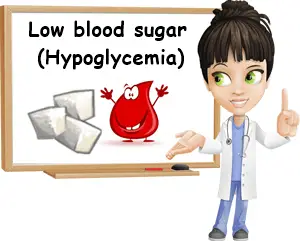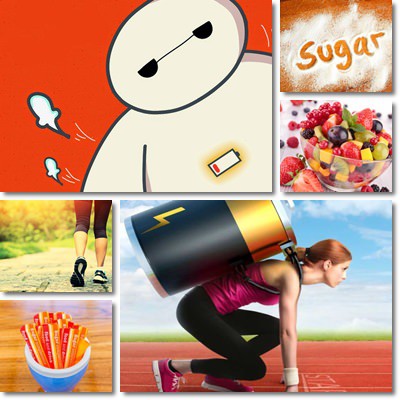Low blood sugar is also known as hypoglycemia or low blood glucose and refers to having a lower than normal level of sugars in the blood.
Hypoglycemia in diabetics occurs when their blood glucose levels drop below 70 milligrams of glucose per deciliter of blood (70 mg/dL). Hypoglycemia that is unrelated to diabetes occurs when glucose levels drop below 50 milligrams of glucose per deciliter of blood (50 mg/dL). These values are set for an average adult and may not apply to children.
Hypoglycemia that is unrelated to diabetes is easily diagnosed based on symptoms. However, not everyone with low blood sugar may experience the exact same symptoms at the exact same intensity as others.
Moreover, hypoglycemia shares common symptoms with other medical conditions, so it may be difficult for someone who has never experienced low blood sugar to correctly identify it and address it accordingly.
Hypoglycemia can occur in perfectly healthy individuals and, depending on how long it takes until we address it, it may get either worse worse or better.

Hypoglycemia (low blood sugar levels) without diabetes. Non-diabetic hypoglycemia refers to having low levels of sugar (aka glucose) in our blood plasma, without it being related to diabetes.
There are factors that may increase our risk of hypoglycemia, but overall, the condition can be managed successfully and prevented from reoccurring by simply addressing dietary and lifestyle factors that encourage it. Find out below what the 10 most common causes of hypoglycemia are.
10 Causes Of Hypoglycemia
1) Not eating for several hours
Skipping meals, eating too little, delaying eating, fasting or not eating for several hours, regardless of the reason, can cause our blood sugar levels to drop considerably.
2) Not eating enough
Whether it’s because we are on a diet or simply have something more important to do than to eat, not eating enough can cause us to become hypoglycemic. Starvation is a cause of hypoglycemia as well.
3) Nausea from being sick or pregnant
Feeling sick and nauseous can have us refuse food or not be able to keep food down and may result in hypoglycemia. Pregnancy morning sickness can lead to hypoglycemia for the same reasons.
4) Increasing exercise difficulty
Working out more than we usually do or suddenly taking on lengthier, more strenuous exercise routines without having eaten enough can cause a hypoglycemic crisis.

5) Low carbohydrate intake
Carbohydrates are a macronutrient found in pasta, bread, cereals, biscuits (complex carbohydrates) or various desserts, honey, sugar, jam, candy, cookies and other sweets (simple carbohydrates).
Our body breaks them down into glucose to raise our blood sugar levels and provide energy. Eating too little carbohydrates (or none) deprives our body of fast energy raising our blood sugar levels and may cause us to become hypoglycemic if we delay a meal, for example, and only eat protein and some fats which take longer to get digested and absorbed.
6) Dehydration
When we are dehydrated, we may feel a reluctance to eat and postpone it or avoid it altogether, risking hypoglycemia. Dehydration, hypoglycemia and high temperatures are three main causes of ill health that can predispose to complications in risk categories such as children, the elderly and anyone with a chronic condition.
7) Poor dietary habits
Eating high amounts of simple carbohydrates in the form of sweets and desserts causes our blood sugar levels to go up really fast and, as soon as our body processes these sugars, which does not take long, our blood sugar levels will go down fast, resulting in hypoglycemia symptoms. Enjoying a balanced meal, with proportionate amounts of complex carbohydrates, protein and fats regulates our blood glucose levels.
8) Alcohol consumption
Our liver releases glycogen, a form of glucose, into our bloodstream. This contributes to raising our blood sugar levels so they don’t get too low.
Alcohol consumption impairs liver function because our liver has to process the alcohol instead of releasing glycogen, which leads to hypoglycemia.
The effects are worse if you don’t eat before consuming alcohol and even afterwards. Eating a balanced meal containing complex carbohydrates which release sugar steadily into the bloodstream, but also protein and fats to provide steady energy levels before drinking is important to avoid hypoglycemia.
9) Medicine side effects
Certain medicines such as insulin used to treat diabetes can lead to hypoglycemia, particularly when the medicines are not administered according to recommendations.
When taking insulin to treat diabetes, it is best to correlate eating habits and physical activity with the prescribed treatment plan.
10) Certain medical conditions
Liver and kidney disease, pancreas dysfunction or tumors, adrenal glands problems (Addison’s disease), hypothyroidism and other endocrine conditions, malabsorption or nerve damage at the gastrointestinal level, fast stomach emptying, serious infections, type 1 glycogen storage disease etc. can all lead to hypoglycemia.
20 Signs and symptoms Of Hypoglycemia
Here is how to tell if you have low blood sugar (hypoglycemia):
1) Hunger, often accompanied by irritability.
2) Headaches.
3) Nausea.
4) Paleness.
5) Tingling or numbness in the tongue.
6) Weakness.
7) Drowsiness.
8) Fatigue.
9) Sweating, clamminess (cold and sticky sweat).
10) Rapid pulse, feeling your heart racing, palpitations.
11) Chills and shivering.
12) Trembling, shaking.
13) Shallow breathing.
14) Mood changes.
15) Irritability, anxiety, nervousness, anger.
16) Lightheadedness or dizziness.
17) Confusion, poor concentration, forgetfulness.
18) Feeling disoriented, poor coordination.
19) Blurry or double vision.
20) Seizures, loss of consciousness.
Some of the signs and symptoms of low blood sugar are commonly seen in other medical conditions such as dehydration or low blood pressure.
Our brain is strongly affected by hypoglycemia because blood glucose is one of its main sources of food. This is why hypoglycemia leads to mood changes, irritability, anger, anxiety, increased stress, confusion, foggy thinking, poor concentration and coordination, disorientation etc.
Prevention and management Of Hypoglycemia
The best solutions for managing and preventing (non-diabetic) hypoglycemia depend on what is causing blood sugar levels to drop in the first place.
Addressing the cause is the key to restoring normal blood sugar levels and a feeling of wellbeing.
1) Taking immediate measures
When in a hypoglycemic crisis, eating about 15-20 g of glucose, 2 tablespoons of honey, some raisins, a cookie, several crackers, a small can of regular soda or about 100-120 ml of fruit juice can help restore our blood sugar levels fast and enable us to eat a decent meal.
It should take at most 15 minutes until we should start feeling better. If blood sugar levels are still low, we are advised to eat another 15-20 g of simple carbohydrates. Avoid large, heavy meals.
2) Improving our eating habits
Eating at regular intervals, reducing fasting intervals by eating as often as needed (5-6 small meals a day), eating sufficient carbohydrates, preferably complex ones with a slow release, matching our diet to the intensity of our exercise routine are all helpful measures.
In my experience, it is never a good solution to go to bed, school, work etc. feeling hungry.
3) Avoiding certain foods and alcohol
Avoiding simple sugars in the form of refined sugar, sweets or candies in favor of complex carbohydrates such as whole grain pasta or breads as well as avoiding alcohol can help prevent hypoglycemia symptoms. Simple sugars should only be a last resort for treating a hypoglycemic crisis.
4) Manage underlying conditions
If your hypoglycemia is caused by a specific medical condition, it is best to manage it according to your doctor’s recommendations because treating the cause will help improve the symptoms. Diabetes sufferers should follow their doctor’s recommendations closely and take their medication accordingly.
5) Adjust exercise routines
Because too intense physical exercise can trigger a hypoglycemia episode, it might be wise to adjust intensity so that you are not in the position to burn all your energy and risk hypoglycemia.
6) Watch out for dehydration
Not wanting to eat when it’s hot outside and we are dehydrated is a normal reaction. However, it can lead to hypoglycemia if we go too much without eating anything.
Making sure we eat small meals at regular intervals, even though we don’t necessarily feel hungry, is important when we know we’ve gone too long without eating anything.
The same goes for feeling sick: even though the accompanying nausea might have us refuse food altogether, we should still eat something to avoid hypoglycemia. For example, whenever I feel sick, I make sure I eat a small bowl of boiled, unflavored white rice with a grated apple just to keep me going until I feel like eating something else. We should never get to the point that we are unable to help ourselves and risk our health and well being in the process.
